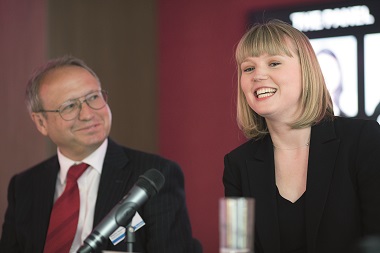Charlotte Proudman: Why I took a stand against sexism

The lawyer who found herself the subject of a torrent of abuse for standing up to sexism talks to CMI about how she weathered the storm and bounced back stronger than ever
Matt ScottIn September 2015, Charlotte Proudman unexpectedly found herself at the centre of a sexism row after calling out one of her peers for making sexist comments in a message to her on business networking site LinkedIn.
Proudman decided to take a stand, sharing the exchange on Twitter, and in response was subjected to horrible online abuse, being labelled a ‘feminazi’ and receiving rape and death threats through Twitter and email.
But how did she bounce back from the furore that enveloped her and survive the media storm that threatened to impact on her flourishing career as a barrister?
Proudman says she relied on friends, family and the kindness of supporters.
“I was fortunate in having a very close support network from friends and family members who were there throughout all of the adverse experiences,” she says. “most particularly I leaned on mentors – people who I knew through professional networks who had been there throughout most of my career and perhaps in their own walks of life had experienced issues similar to myself, but they were more senior and therefore could guide me through this period of turbulence.
“I had a huge response from strangers, although it was rather divided. I received a lot of negativity, such as death threats and rape threats. But on the other hand I also received a lot of support, mainly from women, but also men who really encouraged me in standing up against sexism within the workplace, and said I had given them more confidence in speaking up and taking a stand.”
As well as the outpouring of support Proudman received, she also reached out to other women who had taken a stand against sexism to seek advice as to how they had dealt with such a public torrent of abuse and vicious threats.
“I also reached out to well-known, prominent feminists who themselves had experienced this kind of backlash and they were unbelievably supportive,” she says. “They shared their own experiences, which were very similar to mine, which made me realise I was not alone, and the whole experience would come to an end.”
Speaking out was the only way
Despite the backlash, Proudman is proud in her choice to take a stand, and says that with the luxury of hindsight she would still make the same decision, knowing that taking a stand and speaking out is the only way women will achieve equality in the workplace.
“Even now, knowing the end result, I wouldn’t have changed the way I reacted,” Proudman says. “I responded in a way that I believed was appropriate given the sexual harassment and sexism I have experienced, and in my view it had to be challenged and called out.
“The only way in which women are not going to experience this type of sexism or sexual harassment in the workplace is if they do challenge it head on. I understand that putting your head above the parapet can have serious consequences and a backlash, and many women would of course shy away from that, understandably so. But I would encourage women, if they feel able and comfortable, to speak out against it.
“That’s the only way we are really going to create a cultural shift in attitudes and behaviours towards women,” she adds.
Proudman says the experience has in no way constituted ‘career suicide’. She continues to work as a barrister specialising in women’s rights and family law. “Speaking out certainly hasn’t resulted in career suicide, my career is taking off.”
Never look back
But what is the key to bouncing back from such adversity and keeping your career moving in a positive direction?
“A huge amount of self-belief is required,” Proudman says. “Barristers who make it to the top believe in themselves 100%, there is literally, in some cases, no self-doubt. Having conviction in your actions, and the success that you have achieved throughout your career and knowing you can continue to do so is essential.
“My career has taken a different but positive twist. I have been branded a feminist barrister so I have decided to own it, and to use the platform I have been given to speak about women’s rights, and the need for progressive legal change.”
“For me, I refuse to look back at what had happened, and regret it, or scrutinise it, I continue to move forward, and learn from those experiences.
“After all, I’m on the right side of history.”

Press & Media Enquiries
For more information or to request interviews, contact CMI's Press Team on 020 7421 2705 or email press.office@managers.org.uk


